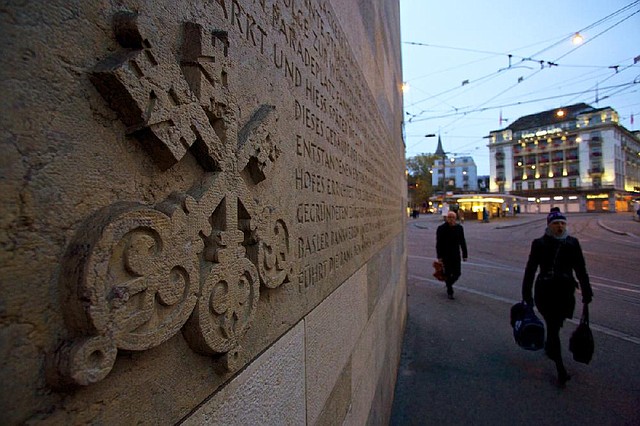UBS said to be near deal with regulators
Fine seen topping Barclays’ $455 million
Pedestrians pass the UBS logo displayed outside the bank’s headquarters in Zurich, Switzerland in October. Switzerland’s biggest lender is said to be nearing a settlement with regulators over allegations traders tried to rig global interest rates.
Tuesday, December 4, 2012
LONDON — UBS AG, Switzerland’s biggest lender, is close to agreements with U.S. and U.K. regulators to pay more than $466 million in fines over allegations traders tried to rig global interest rates, a person with knowledge of the talks said.
An announcement may come as soon as next week, said the person, who declined to be identified because the talks are private. More than 25 people have already left UBS after the lender’s own internal investigation, another person said last month.
Global authorities are investigating claims that more than a dozen banks altered submissions used to set benchmarks, such as the London interbank offered rate, to profit from bets on interest-rate derivatives or to make the lenders’ finances appear healthier. UBS’s fine may surpass the record $455 million Barclays PLC, Britain’s second-biggest bank, paid in June to settle claims it attempted to manipulate Libor.
“UBS has been cooperating fully with the regulatory and enforcement authorities in connection with Libor investigations,” said Mark Panday, a Hong Kong-based spokesman at the Zurich based lender. “As we are in the midst of discussions with those authorities, we cannot comment further.”
Regulators are focusing on whether UBS traders colluded with other banks to influence rates in an effort to increase profit, the person said. U.S. authorities want to seal a deal with the Zurich-based bank by the end of the month, though the discussions could continue into next year or break down, according to The New York Times, which reported the discussions earlier Monday citing unidentified officials.
Steve Adamske, a spokesman for the Commodity Futures Trading Commission, and officials at the U.K. Financial Services Authority declined to comment on the Times report. The U.S. Justice Department also declined to comment, according to the newspaper.
British prosecutors are poised to arrest former traders and rate setters at UBS for questioning over their role in the Libor scandal, a person with knowledge of the investigation said last month. The Serious Fraud Office, which is conducting a criminal probe in parallel with the Justice Department’s fraud division, is focusing on email messages between traders at UBS and other banks.
David Green, the director of the Serious Fraud Office, has said the agency is considering charges against individuals of conspiracy to defraud. The agency, which doesn’t have the power to arrest people, has brought in the City of London Police for help, he said.
Libor, a benchmark for more than $300 trillion in financial products worldwide, is derived from a survey of banks conducted each day on behalf of the British Bankers’ Association in London. The rates help determine borrowing costs for everything from mortgages to student loans.
So far, only Japanese regulators have punished UBS for interest-rate manipulation. In December 2011, the Japan Financial Supervisory Agency ordered the UBS Securities Japan division to suspend trading in derivatives transactions related to Yen Libor and Euroyen Tibor from Jan. 10 to Jan. 16. The regulator found that the securities unit had “serious problems” in its internal controls and ordered it to develop a new compliance program.
UBS is one of the first banks to have disclosed the investigation. In its 2010 annual report published in early 2011, the bank said it had received subpoenas from the U.S. Securities and Exchange Commission, the Commodity Futures Trading Commission and the Justice Department, and an order to provide information from the Japan Financial Supervisory Agency.
The bank said the investigations focused “on whether there were improper attempts by UBS, either acting on its own or together with others, to manipulate Libor rates at certain times.”Information for this article was contributed by Edward Evans and Russell Ward of Bloomberg News.
Business, Pages 23 on 12/04/2012
